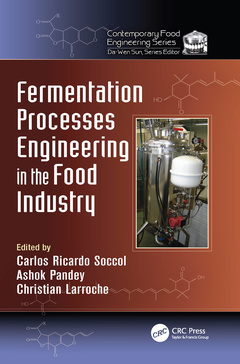Description
Fermentation Processes Engineering in the Food Industry
Contemporary Food Engineering Series
Coordinators: Soccol Carlos Ricardo, Pandey Ashok, Larroche Christian
Language: English
Subjects for Fermentation Processes Engineering in the Food Industry:
Keywords
Starter Cultures; SMF; lactic; Solid State Fermentation; acid; Fermented Milk; bacteria; Lactic Acid; fermented; Probiotic; starter; Probiotic Microorganisms; cultures; Bubble Column; milk; Fermented Dairy Products; fatty; Fermented Foods; solid; Fermented Milk Products; state; Lab; Bubble Column Reactors; Lactic Acid Fermentation; Ethanol Fermentation; Probiotic Strains; Functional Foods; Bubble Column Bioreactors; Dairy Fermented; Heterofermentative Lab; Food Fermentation; Health Benets; Nondigestible Oligosaccharides; Cfd Software Package; Soybean Molasses
Publication date: 10-2016
· 15.6x23.4 cm · Paperback
Publication date: 03-2013
486 p. · 15.6x23.4 cm · Hardback
Description
/li>Contents
/li>Readership
/li>Biography
/li>
With the advent of modern tools of molecular biology and genetic engineering and new skills in metabolic engineering and synthetic biology, fermentation technology for industrial applications has developed enormously in recent years. Reflecting these advances, Fermentation Processes Engineering in the Food Industry explores the state of the art of the engineering technology aspects of fermentation processes in diverse food sectors.
The book describes the benefits of fermented foods in human health in both dairy and non-dairy products and beverages. It examines applications of microalgae in the food industry and explains the application of metabolic engineering in the production of fermented food ingredients. Exploring a host of important topics in engineering fermentation processes, the book covers topics such as:
- Methods and techniques for the isolation, improvement, and preservation of the microbial cultures used in the food fermentation industry
- The fundamentals of fermentation processes, modes of fermentation, and the principles of upstream operation
- Physical and chemicals factors that affect fermentation processes
- Different types of fermenters employed in submerged and solid-state fermentation
- Unitary operations for solid-liquid separation, concentration, and drying of fermented foods
- Instrumentation and control of industrial fermentation processes
The final chapter discusses the potential application of a biorefinery concept to add value to food industry wastes and presents a case study describing an integrated project in which the concept was applied.
An essential reference for all food sector professionals, this volume surveys critical trends in the food, beverage, and additive industry and explores the sustainability of these processes.
Applications of Metabolic Engineering in the Production of Fermented Foods and Food Ingredients. Isolation, Improvement, and Preservation of Microbial Cultures. Physical and Chemical Factors Affecting Fermentation in Food Processing. Upstream Operations of Fermentation Processes. Theoretical Tools to Predict Physicochemical Properties of Industrial Foods and Cultivation Media. Characterization of Bioreactors Using Computational Fluid Dynamics. Laboratory and Industrial Bioreactors for Submerged Fermentations. Laboratory and Industrial Bioreactors for Solid-State Fermentation. Downstream Operations of Fermented Products. Instrumentation and Control of Industrial Fermentative Processes. Fermented Foods and Human Health Benefits of Fermented Functional Foods. Industrial Fermentation for Production of Alcoholic Beverages. Production of Dairy Products. Dairy and Nondairy Probiotic Products and Beverages. Bioadditives Produced by Fermentation. Microalgae for Food Production. Biorefinery Concept Applied to Valorization of Agro-Food Coproducts and Wastes: Integrated Process for Waste Recycling and Effluent Treatment. Index.
Carlos Ricardo Soccol is the research group leader of the Department of Bioprocess Engineering and Biotechnology (DEBB)at the Federal University of Paraná, Brazil. He has 20 years of experience in biotechnological research and development of bioprocesses with industrial application. His research interests are in science and food technology, with emphasis on agroindustrial and agroalimentary biotechnology, bioprocess engineering, solid-state fermentation, submerged fermentation, bioseparations, industrial bioprocesses, enzyme technology, tissue culture, bioindustrial projects, and bioproduction.
Ashok Pandey Christian Larroche




